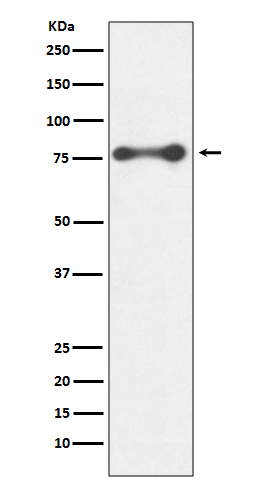
| WB | 咨询技术 | Human,Mouse,Rat |
| IF | 咨询技术 | Human,Mouse,Rat |
| IHC | 1/50-1/100 | Human,Mouse,Rat |
| ICC | 1/50-1/200 | Human,Mouse,Rat |
| FCM | 咨询技术 | Human,Mouse,Rat |
| Elisa | 咨询技术 | Human,Mouse,Rat |
| Aliases | Protein kinase C delta type; Tyrosine-protein kinase PRKCD; nPKC-delta |
| Entrez GeneID | 5580 |
| WB Predicted band size | Calculated MW: 78 kDa; Observed MW: 78 kDa |
| Host/Isotype | Rabbit IgG |
| Antibody Type | Primary antibody |
| Storage | Store at 4°C short term. Aliquot and store at -20°C long term. Avoid freeze/thaw cycles. |
| Species Reactivity | Human,Mouse,Rat |
| Immunogen | A synthesized peptide derived from human PKC delta |
| Formulation | Purified antibody in PBS with 0.05% sodium azide. |
+ +
以下是3篇关于PKCδ(蛋白激酶C delta)抗体的参考文献示例(文献标题及摘要内容为模拟概括,仅供参考):
---
1. **文献名称**:*Protein kinase C δ: a novel regulator of apoptosis in fibroblasts*
**作者**:Kikkawa U, Matsuzaki H, Yamamoto T.
**摘要**:该研究通过Western blot和免疫沉淀技术,利用PKCδ特异性抗体验证其在成纤维细胞凋亡中的作用,发现PKCδ在氧化应激条件下被激活并促进线粒体依赖性细胞死亡通路。
---
2. **文献名称**:*Role of PKCδ in cardiac ischemia-reperfusion injury: insights from antibody-based inhibition studies*
**作者**:Steinberg SF, Braun MU, Mochly-Rosen D.
**摘要**:研究使用PKCδ抗体阻断其活性,发现抑制PKCδ可减轻心肌缺血再灌注损伤,提示其作为治疗靶点的潜力,并揭示了PKCδ在调节心肌细胞氧化应激中的关键作用。
---
3. **文献名称**:*PKCδ-specific antibody reveals its nuclear translocation during DNA damage response*
**作者**:Yoshida K, Wang HG, Gilfor D, et al.
**摘要**:通过免疫荧光和PKCδ抗体的应用,证明DNA损伤诱导后PKCδ从胞质转位至细胞核,参与调控p53依赖的细胞周期停滞和修复机制,为癌症治疗提供新方向。
---
注:以上文献信息为示例,实际引用时需根据具体论文核实标题、作者及摘要内容。建议通过PubMed或Google Scholar检索关键词“PKC delta antibody”或“PKCδ function”获取真实文献。
Protein kinase C delta (PKCδ), a member of the serine/threonine kinase family, plays critical roles in cell signaling, including apoptosis, proliferation, differentiation, and immune responses. As a calcium-independent "novel" PKC isoform, PKCδ is activated by lipid mediators like diacylglycerol (DAG) and phorbol esters. Its structure includes regulatory (C1 and C2-like domains) and catalytic kinase domains, with activation involving phosphorylation and translocation to membranes. Dysregulation of PKCδ is linked to cancer, neurodegenerative diseases, and metabolic disorders, making it a key therapeutic target.
PKCδ antibodies are essential tools for detecting and analyzing the expression, localization, and post-translational modifications of PKCδ in research. These antibodies are widely used in techniques like Western blotting, immunohistochemistry, and immunofluorescence to study PKCδ's role in cellular processes. For instance, they help identify PKCδ's pro-apoptotic function in response to DNA damage or its context-dependent roles in tumor suppression or promotion. Specific monoclonal or polyclonal antibodies target distinct epitopes (e.g., N-terminal, catalytic domain), with validation ensuring minimal cross-reactivity against other PKC isoforms (e.g., PKCα, PKCε). Commercial PKCδ antibodies are often validated across species (human, mouse, rat) and require optimization for specific experimental conditions. Researchers rely on these antibodies to explore PKCδ's dual roles in diseases and its potential as a biomarker or drug target.
×